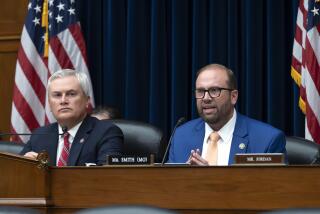Congress and Ethics
- Share via
Both political parties have established “opposition research” teams to “collect potentially damaging information” on opponents in the next election (Part I, June 3). If the voters permit this perversion of the electoral process, they deserve the calamities that will ensue.
It is little wonder that the U.S. has slipped in the ranks of world leadership when our candidates for high office are more concerned with lining their own pockets and besmirching their enemies than with confronting the important issues of the day, such as homelessness, injustice, hunger, nuclear proliferation, arms control, and economic dislocation.
Our failure to solve these problems on terms favorable to our interests will lead to further erosion of our international standing, while the head of communications for the Republican Party smugly asserts that a mud-filled dossier on the opposition is “frankly the single best resource we can put in the hands of Republican candidates at all levels.”
Rather than starting their hand-wringing lamentations after the election, the American people (led perhaps by their self-appointed representatives of the press?) should demand that politicians quit acting like spoiled schoolchildren and begin debating the issues of global life and death. Registered voters should notify their respective party leaders that they will refuse to contribute to any candidate who spends more time and effort on mudslinging than on presenting positive answers to difficult issues.
“None of the above” should become a viable alternative when faced with candidates who know more about each other’s boudoirs than about the European Economic Community.
Only by restoring some sense of what government is supposed to do will we regain the respect and admiration of the world. If congressmen would lift the public-opinion standing of their own institution, they could start by assuming the mantle of leadership they have been trampling in the dust.
RICHARD A. SHERER
Culver City
More to Read
Get the L.A. Times Politics newsletter
Deeply reported insights into legislation, politics and policy from Sacramento, Washington and beyond. In your inbox twice per week.
You may occasionally receive promotional content from the Los Angeles Times.










